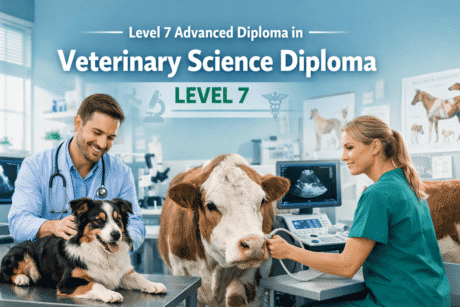Course Features
Price
Study Method
Online | Self-paced
Course Format
Reading Material - PDF, article
Duration
3 hours, 5 minutes
Qualification
No formal qualification
Certificate
At completion
Additional info
Coming soon
- Share
Overview
Agricultural Science is at the heart of modern food production, environmental stewardship, and sustainable land use. This Level 3 Advanced Diploma gives learners a comprehensive understanding of how plant, soil, and animal systems work together, and how scientific knowledge can be applied to develop resilient, productive agricultural practices. Whether you’re new to the sector or looking to strengthen existing skills, this course provides clear, structured learning that builds confidence at every step.
You will explore the foundations of agricultural systems, gaining a strong scientific understanding of plant biology, crop production, animal health, and livestock management. The course places particular emphasis on the practical skills required in real-world farm environments, giving you insight into how crops grow, how animals develop, and how soil quality shapes long-term productivity. Alongside the scientific elements, you will also discover how sustainable agriculture is reshaping the industry—learning how to balance productivity with environmental responsibility.
A key strength of this programme is its blend of science and business. You will learn the economic principles that drive the agricultural sector, including farm management, budgeting, and long-term planning. This combination of scientific knowledge and strategic thinking prepares you to make informed decisions, whether you aim to work on a farm, support agricultural businesses, or pursue further study.
The course is delivered in a learner-friendly, accessible format with clear examples, practical explanations, and guidance you can apply immediately. By the end of your studies, you’ll have a solid foundation in plant science, animal science, soil management, sustainability, and agricultural business principles.
Upon completion, learners will receive a free course completion certificate, with the option to purchase premium certificates and transcripts for professional or academic use. You will also receive 5-star rated support available 24/7 via email, ensuring you have guidance whenever you need it.
Who is this course for?
Agricultural Science is at the heart of modern food production, environmental stewardship, and sustainable land use. This Level 3 Advanced Diploma gives learners a comprehensive understanding of how plant, soil, and animal systems work together, and how scientific knowledge can be applied to develop resilient, productive agricultural practices. Whether you’re new to the sector or looking to strengthen existing skills, this course provides clear, structured learning that builds confidence at every step.
You will explore the foundations of agricultural systems, gaining a strong scientific understanding of plant biology, crop production, animal health, and livestock management. The course places particular emphasis on the practical skills required in real-world farm environments, giving you insight into how crops grow, how animals develop, and how soil quality shapes long-term productivity. Alongside the scientific elements, you will also discover how sustainable agriculture is reshaping the industry—learning how to balance productivity with environmental responsibility.
A key strength of this programme is its blend of science and business. You will learn the economic principles that drive the agricultural sector, including farm management, budgeting, and long-term planning. This combination of scientific knowledge and strategic thinking prepares you to make informed decisions, whether you aim to work on a farm, support agricultural businesses, or pursue further study.
The course is delivered in a learner-friendly, accessible format with clear examples, practical explanations, and guidance you can apply immediately. By the end of your studies, you’ll have a solid foundation in plant science, animal science, soil management, sustainability, and agricultural business principles.
Upon completion, learners will receive a free course completion certificate, with the option to purchase premium certificates and transcripts for professional or academic use. You will also receive 5-star rated support available 24/7 via email, ensuring you have guidance whenever you need it.
Requirements
Agricultural Science is at the heart of modern food production, environmental stewardship, and sustainable land use. This Level 3 Advanced Diploma gives learners a comprehensive understanding of how plant, soil, and animal systems work together, and how scientific knowledge can be applied to develop resilient, productive agricultural practices. Whether you’re new to the sector or looking to strengthen existing skills, this course provides clear, structured learning that builds confidence at every step.
You will explore the foundations of agricultural systems, gaining a strong scientific understanding of plant biology, crop production, animal health, and livestock management. The course places particular emphasis on the practical skills required in real-world farm environments, giving you insight into how crops grow, how animals develop, and how soil quality shapes long-term productivity. Alongside the scientific elements, you will also discover how sustainable agriculture is reshaping the industry—learning how to balance productivity with environmental responsibility.
A key strength of this programme is its blend of science and business. You will learn the economic principles that drive the agricultural sector, including farm management, budgeting, and long-term planning. This combination of scientific knowledge and strategic thinking prepares you to make informed decisions, whether you aim to work on a farm, support agricultural businesses, or pursue further study.
The course is delivered in a learner-friendly, accessible format with clear examples, practical explanations, and guidance you can apply immediately. By the end of your studies, you’ll have a solid foundation in plant science, animal science, soil management, sustainability, and agricultural business principles.
Upon completion, learners will receive a free course completion certificate, with the option to purchase premium certificates and transcripts for professional or academic use. You will also receive 5-star rated support available 24/7 via email, ensuring you have guidance whenever you need it.
Career path
Agricultural Science is at the heart of modern food production, environmental stewardship, and sustainable land use. This Level 3 Advanced Diploma gives learners a comprehensive understanding of how plant, soil, and animal systems work together, and how scientific knowledge can be applied to develop resilient, productive agricultural practices. Whether you’re new to the sector or looking to strengthen existing skills, this course provides clear, structured learning that builds confidence at every step.
You will explore the foundations of agricultural systems, gaining a strong scientific understanding of plant biology, crop production, animal health, and livestock management. The course places particular emphasis on the practical skills required in real-world farm environments, giving you insight into how crops grow, how animals develop, and how soil quality shapes long-term productivity. Alongside the scientific elements, you will also discover how sustainable agriculture is reshaping the industry—learning how to balance productivity with environmental responsibility.
A key strength of this programme is its blend of science and business. You will learn the economic principles that drive the agricultural sector, including farm management, budgeting, and long-term planning. This combination of scientific knowledge and strategic thinking prepares you to make informed decisions, whether you aim to work on a farm, support agricultural businesses, or pursue further study.
The course is delivered in a learner-friendly, accessible format with clear examples, practical explanations, and guidance you can apply immediately. By the end of your studies, you’ll have a solid foundation in plant science, animal science, soil management, sustainability, and agricultural business principles.
Upon completion, learners will receive a free course completion certificate, with the option to purchase premium certificates and transcripts for professional or academic use. You will also receive 5-star rated support available 24/7 via email, ensuring you have guidance whenever you need it.
-
- Introduction to Agriculture 00:10:00
- Agricultural Systems 00:10:00
-
- Plant Biology 00:10:00
- Crop Production 00:10:00
- Animal Biology 00:10:00
- Livestock Management 00:10:00
- Principles of Sustainable Agriculture 00:10:00
- Environmental Impact of Agriculture 00:10:00
- Exam of Agricultural Science Level 3 Advanced Diploma 00:50:00

No Reviews found for this course.
Is this certificate recognized?
Yes, our premium certificate and transcript are widely recognized and accepted by embassies worldwide, particularly by the UK embassy. This adds credibility to your qualification and enhances its value for professional and academic purposes.
I am a beginner. Is this course suitable for me?
Yes, this course is designed for learners of all levels, including beginners. The content is structured to provide step-by-step guidance, ensuring that even those with no prior experience can follow along and gain valuable knowledge.
I am a professional. Is this course suitable for me?
Yes, professionals will also benefit from this course. It covers advanced concepts, practical applications, and industry insights that can help enhance existing skills and knowledge. Whether you are looking to refine your expertise or expand your qualifications, this course provides valuable learning.
Does this course have an expiry date?
No, you have lifetime access to the course. Once enrolled, you can revisit the materials at any time as long as the course remains available. Additionally, we regularly update our content to ensure it stays relevant and up to date.
How do I claim my free certificate?
I trust you’re in good health. Your free certificate can be located in the Achievement section. The option to purchase a CPD certificate is available but entirely optional, and you may choose to skip it. Please be aware that it’s crucial to click the “Complete” button to ensure the certificate is generated, as this process is entirely automated.
Does this course have assessments and assignments?
Yes, the course includes both assessments and assignments. Your final marks will be determined by a combination of 20% from assignments and 80% from assessments. These evaluations are designed to test your understanding and ensure you have grasped the key concepts effectively.
Is this course accredited?
We are a recognized course provider with CPD, UKRLP, and AOHT membership. The logos of these accreditation bodies will be featured on your premium certificate and transcript, ensuring credibility and professional recognition.
Will I receive a certificate upon completion?
Yes, you will receive a free digital certificate automatically once you complete the course. If you would like a premium CPD-accredited certificate, either in digital or physical format, you can upgrade for a small fee.
Course Features
Price
Study Method
Online | Self-paced
Course Format
Reading Material - PDF, article
Duration
3 hours, 5 minutes
Qualification
No formal qualification
Certificate
At completion
Additional info
Coming soon
- Share
SVQ Level 3 in Hairdressing (Styling & Salon Management)
Course Line237£490.00Original price was: £490.00.£14.99Current price is: £14.99.Restaurant Operations Coordinator
Course Line237£490.00Original price was: £490.00.£14.99Current price is: £14.99.Functional Skills English Level 2
Course Line246£490.00Original price was: £490.00.£14.99Current price is: £14.99.
Related Courses
Waste Management Level 8 Advanced Diploma
£490.00Original price was: £490.00.£14.99Current price is: £14.99. 238
238Pet Training & Behaviour Mastery: Dogs, Cats, Rabbits & Pet First Aid
£490.00Original price was: £490.00.£14.99Current price is: £14.99. 237
237Level 7 Advanced Diploma in Veterinary Science
£490.00Original price was: £490.00.£14.99Current price is: £14.99. 238
238
Related Courses
Waste Management Level 8 Advanced Diploma
£490.00Original price was: £490.00.£14.99Current price is: £14.99. 238
238Pet Training & Behaviour Mastery: Dogs, Cats, Rabbits & Pet First Aid
£490.00Original price was: £490.00.£14.99Current price is: £14.99. 237
237Level 7 Advanced Diploma in Veterinary Science
£490.00Original price was: £490.00.£14.99Current price is: £14.99. 238
238








